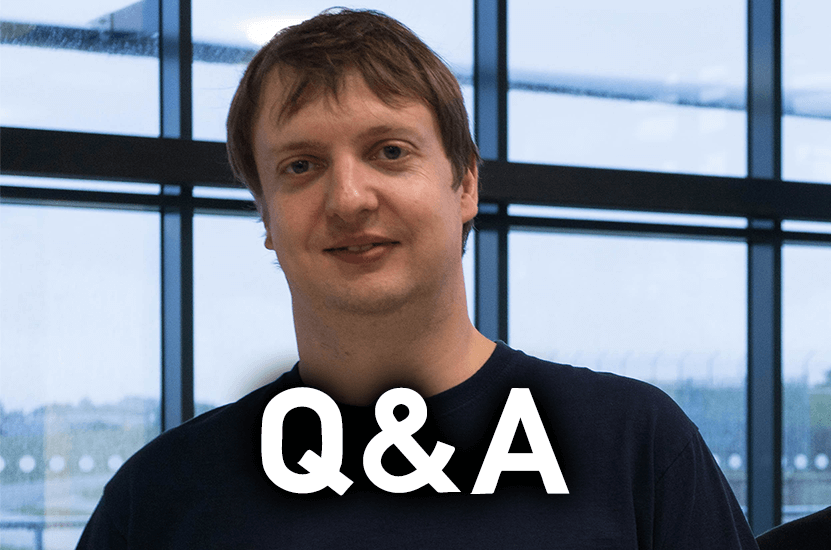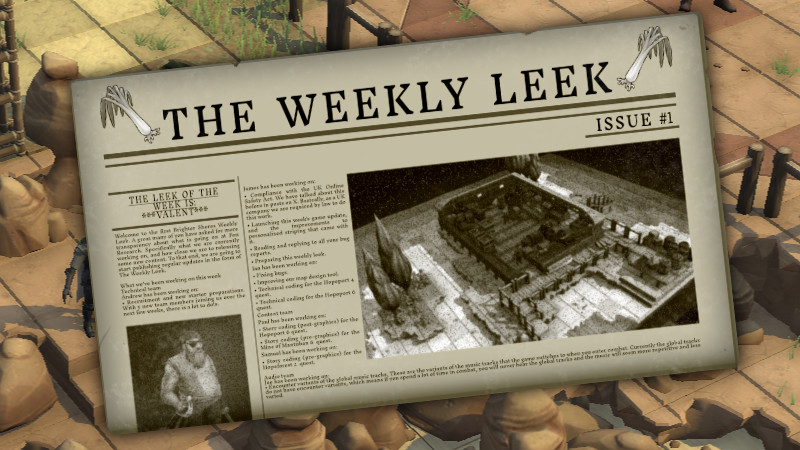
Brighter Shores Explored: A Sit-Down with Andrew Gower
Published in News on March 28th, 2024
Nearly a quarter-century after launching the iconic RuneScape, Andrew Gower (𝕏), co-founder of Jagex and the visionary behind the game's original development and engine, is poised to introduce a new MMO venture: Brighter Shores. Slated for release on PC and Mac later this year, this free-to-play game draws inevitable comparisons to RuneScape, both in aesthetics and gameplay.
Gower's journey with Brighter Shores is marked by a blend of independence and seasoned expertise. Without the constraints of investor or publisher expectations, his focus is clear: to captivate players. At the heart of Fen Research, Gower's small yet dedicated development team of eight prioritizes engagement over monetization strategies. Amidst a gaming landscape often criticized for its reliance on microtransactions, Brighter Shores aims to stand out by being transparent about its premium offerings. Gower envisions the game as a tranquil retreat, offering players the flexibility to engage with the content at their own pace.
Brighter Shores, while echoing elements of RuneScape, promises a novel MMO experience that shifts the emphasis from endgame pursuits to the richness of the journey itself. In a recent discussion GamesRadar+ had with Gower, the depth of the game's classes, professions, and its expansive fantasy world was explored, revealing a game design that could uniquely appeal to players seeking a more laid-back gaming experience.
Responses have been condensed and edited for clarity.
Can you elaborate on the reasons behind the decade-long development of this game? What has the daily workflow entailed for the team?
That's quite an interesting story. Firstly, a lot of the reason it's taken so long is because I decided to make things difficult for myself by developing my own game engine. Actually, the original goal that I set myself was to develop a game engine knowing everything I know about what's annoying making games. I had some really good ideas on how to make it much, much easier to make games. And I actually started making the game to prove the engine. Making a computer game is a big, expensive proposition. No one's gonna use an engine unless it's proven. And then you've got a bit of a chicken and egg situation.
We realized the only way we're gonna prove the engine was making a really big game with it ourselves. So I originally started making a completely different game which I might still go back to one day. But everyone's posting on my Twitter, my emails, everyone's saying, hey, what are you doing these days? Are you making another MMO? I hope you're making another MMO. Literally every single person who spoke to me said they hoped I was making another MMO. So eventually, I realized that perhaps I should make another. So in terms of actually starting, then we've probably been working on this in earnest since some point in 2017. But even then, it was quite a slow burn.
How did you conceptualize your vision for this MMO, particularly with references to inspirations from MUDs and other games? It appears there's a shared lineage with titles beyond just RuneScape.
It's all the things that I grew up with, you know. It's old school MUDs, it's point-and-click adventure games, it's tabletop RPGs. When we were making this game early on, we were playing some tabletop RPGs, you'll probably see one there behind me. I love tabletop RPGs, and the reason why we've gone with a sort of grid-based look – originally, it actually had a wooden table drawn on it as well. But we started thinking that was going a bit too far and we took that away. But we really wanted to try and get something that captured that essence of a tabletop RPG, but not being turn-based, you know, being a real-time MMO. But graphically, stylistically, that sort of thing. And that's just because I love, love tabletop RPGs. We've been playing this one behind me every single lunch break for well over a year. It's just what we like.
The game's mechanics, such as blacksmithing and woodcutting, resonate with those of us who have a history with RuneScape. Would you say that such features are ingrained in your design philosophy?
When we were making this game, we didn't look specifically at any previous game. In fact, if anything, we tried as much as possible to do things that hadn't been done before. But there are certain staples that you kind of have to have in a fantasy setting to make it work. And there're certain things that just work really well in that context. But we're very keen not to just be the same game again.
Are all professions accessible simultaneously, and is there a system in place for their interdependence, such as resource sharing?
We've tried to make the professions link into one another quite a bit. We've tried to mix it up a bit. Some of them are more standalone than others because we've tried to, again, have variety, depending on the mood you're in and how you want to play it. As you level up, we've tried to make the pace at which you get new things to do in the professions very rapid so it doesn't get too dry and too repetitive.
They're also linked to the episode structure we've got. So you don't get every single one straightaway. As you go through the game, more and more become available. You can do them all at once, but you have to progress through the story, because we don't want to overwhelm. One thing I was very, very keen on with this game was thinking about the starting experience. MMOs can be quite overwhelming. And so trying to make sure that it starts off with a relatively small amount of stuff you can do, just enough to get you hooked and get you interested, and then it gradually, gently, without feeling artificial and gated, introduces more and more stuff. But it does in a way where it feels like a reward.
We've very carefully designed it so that the most efficient option keeps changing. And it makes it fairly obvious. You don't have to do the most efficient option, you can keep doing the same thing. But the game sort of nudges you to doing different things all the time so it doesn't become making 1,000 swords in a row.
Introducing three distinct classes—Cryoknight, Guardian, and Hammermage—marks a departure from your usual design approach. What motivated this decision, and how do these classes align with or diverge from the classic warrior, rogue, and mage archetypes?
I wanted people to have a reason to have more than one character. It's always nice to have different characters. And all three characters can do magic. That's one thing I should probably mention. So it's not like one is magic and one isn't magic; they've got different types of magic. So the Cryoknights have got ice magic, the Guardians have got nature magic, and the Hammer Mages have got sort of storm magic. They can all do range, they can all do melee. But I did want you to have to make a decision. You don't have to make it at the very beginning, because personally I hate it when you start playing a game and the very first thing they ask you is an absolutely critical decision, when you have absolutely no idea how you're going to make it. Here you start off as a guard and you actually make your way into the game before you have to choose your character class.
How much flexibility is there in customizing one's class compared to perfecting the preset skills?
Yeah, it's more about mastering the class as it's assigned to you. We've got a lot more work to do on that side of things. Probably not going to make it in for launch, but we do want to introduce different weapons with different special attacks, and more. But we also don't want to make the combat really, really complicated and twitchy. The whole game is meant to be a fairly relaxing experience. So what we don't want to do is make it to be like, oh, I've got to do this, I've got to dodge this thing, I've got to do that. We might have that in a few boss battles, but that's not what the majority of the game is meant to be like. But having said that, as the game develops further, we definitely want to have more and different ways you can load out your character to meet your personal preference.
Could you share insights into the open world's design philosophy? What drives exploration, and what can players expect to encounter and achieve?
One of the unusual things about our world is we've gone with a room-based system which has the feeling of a lot of RPGs where your characters will be in a room doing a certain encounter, and then you're in another room doing an encounter. The rooms all connect together; it's very easy to move between one and the other. It has various technical advantages as well, because it lets us instance each room the right number of times based on how many players are in it, so we can make sure that no part of the world gets too crowded or too empty. There's a sweet spot of how crowded you want the game to be to feel nice, but too crowded and it feels just overwhelming and totally empty and it just feels a bit dead.
I'm very keen to cater to players who want to explore and discover. We've got this world map that shows you everywhere you've been but it starts off completely blank, just the room you're in. And each time you explore a new room, it maps it out for you onto the map. You can discover things in the room by clicking on them, and as you do it labels them on the map for you. So it does it all automatically. The first thing a lot of players will probably do is just walk around the world a bit mapping everything out by going to each different room, clicking on things in the room to see what's in them, and letting it put them on the map and just getting a feel for what is where. So you get this lovely feeling of exploration.
For clarification, when discussing the world's structure, are we talking about discrete, manageable areas?
Right, I use the term as a sort of RPG concept where there might be a section of the map which is outdoors, a river or a glade in the forest or something like that, but we define them as rooms and they're all designed with defined exits. So you can't just walk anywhere you like from one location to another. So you might be in a forest clearing and it's almost like an old-school text adventure, there's an exit to the north and there's an exit to the east. And you can choose which way you want to go next.
Regarding the magic system, is it correct to anticipate that teleportation spells will facilitate quicker travel across the game world?
Absolutely, yeah. And the world is actually surprisingly compact as well, because I don't think it's a great deal of fun spending a huge amount of time walking from one place to another. So we've made a very deliberate and conscious decision to try and really pack it in so that there's not just loads of empty space before you find anything. Almost every single room you go into, there's two or three things that you can do there once you've met the level requirements and you've got all the other stuff. So you're not spending a lot of time walking around, and then on top of that there's teleports, as you'd expect, so you don't spend too much time walking.
How long does an average session in a single area last before players find themselves transitioning to new locales?
That's something we mathematically worked out. We've sort of assessed, what is the maximum amount of time between clicks before it starts getting boring? What is the maximum amount of time you should spend in one room before you need to go to the next, you need to go off and bank your stuff, you need to switch to a different activity, or you need to go to the shop to buy something new? And we've very carefully set all those times based on gut feel, admittedly, but they're not random. They're all carefully, carefully balanced to be just right. So just as you're thinking, I'm getting a bit bored of doing this now, which actually isn't very long, you need to stop anyway and you need to go off and do something different.
To ensure I'm understanding correctly, the paid premium pass offers complete access to all game areas and content. Would you say its structure is more akin to the seasonal passes seen in games like Destiny 2, or is it closer to a RuneScape membership model?
Loosely similar. One of the key differences is we're probably not going to do auto-recurring payments. You will have to keep buying the premium pass if you want to keep getting access to the paid content. But we feel that auto-recurring subscriptions are a very hard sell these days. Everyone's got their millions of different streaming service subscriptions, people are getting a certain degree of subscription fatigue. So we've decided to just make a non-recurring payment, you can just buy a pass, get premium one time. It's not a commitment that you're gonna have to pay that forever. It gives you access to absolutely everything we've released up to that date. But obviously, we expect that when we release new episodes, that will drive people to take out a premium pass to enjoy that new episode. And then we'll bring out another episode, and then they'll buy another premium pass to enjoy that season.
You Might Also Like
Recent News
 Fen Research & Brighter Shores: Andrew Gower's Final Joke
Fen Research & Brighter Shores: Andrew Gower's Final Joke Herbalist's Hurdle Quest Launch
Herbalist's Hurdle Quest Launch Weekly Leek #2
Weekly Leek #2 Weekly Leek #1
Weekly Leek #1 Brighter Shores Easter Event (2025) - All 128 Hidden Egg Locations
Brighter Shores Easter Event (2025) - All 128 Hidden Egg Locations 2nd April 2025 - Easter Event
2nd April 2025 - Easter Event Teloril Breaks Down the Online Safety Act and Its Impact
Teloril Breaks Down the Online Safety Act and Its Impact Easter Event, Team Expansion, and Upcoming Game Updates
Easter Event, Team Expansion, and Upcoming Game Updates








